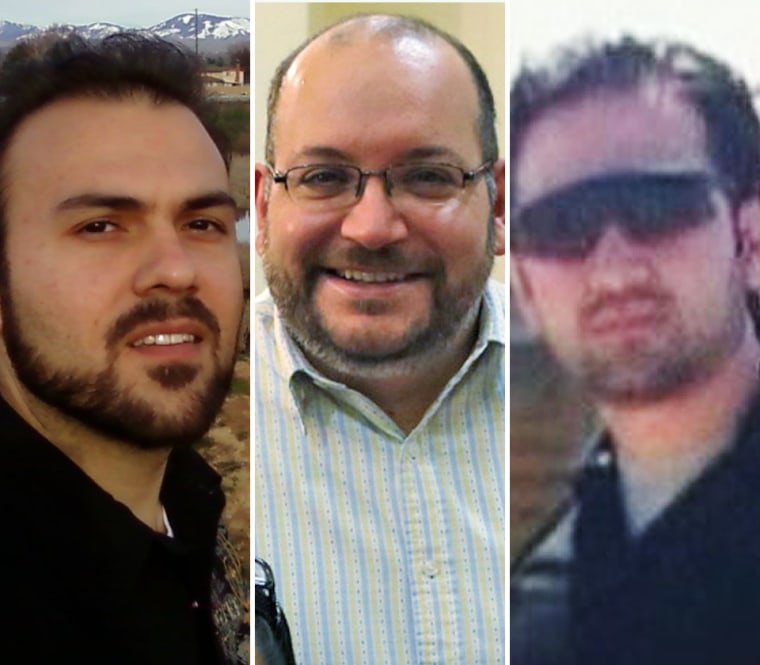The White House on Wednesday denied suggestions that a $400 million cash payment to Iran in January was a "ransom" to free four Americans being held in Tehran — characterizing the move as coincidental.
That sum was actually part of a $1.7 billion settlement to Iran for a decades-long legal dispute that was before an international tribunal in The Hague, according to State Department spokesman John Kirby.
"As we've made clear, the negotiations over the settlement of an outstanding claim at the Hague Tribunal were completely separate from the discussions about returning our American citizens home," Kirby said in a statement. "Not only were the two negotiations separate, they were conducted by different teams on each side, including, in the case of the Hague claims, by technical experts involved in these negotiations for many years."
The State Department formally announced the settlement terms on Jan. 17 — a day after the four Americans were freed. A fifth American was also released, although that was not part of a prisoner swap that included the U.S. releasing seven people charged with violating sanctions against Iran.
The four Americans were identified as Jason Rezaian, a Washington Post reporter who had been convicted of espionage last year; Amir Hekmati, a former Marine who had been held since 2011; Saeed Abedini, a Christian pastor imprisoned since 2012; and a man only named as Nosratollah Khosravi-Roodsari.
Their release and the settlement deal also came on the same weekend that international sanctions on Iran were lifted after the United Nations nuclear agency declared Tehran had fulfilled its commitment to scale back its nuclear program.
Secretary of State John Kerry at the time said the nuclear agreement between Iran and the West and the Americans' release "were not directly related," although he believed the diplomatic process was eased thanks to the nuclear talks.
A Wall Street Journal report Tuesday characterized the Obama administration's $400 million payment to Iran as a "secretly organized" airlift of euros, Swiss francs and other currencies given to Tehran.
It remains illegal for the U.S. to conduct a monetary transaction with Iran in American dollars.
The money was owed to the Islamic republic following a failed arms deal dating back to 1979, when Iran purchased American fighter jets, U.S. officials said.
The Journal didn’t specify when the cash was received in Iran in January, but it could have reportedly arrived the same day the Americans left the country.
House Speaker Paul Ryan responded Wednesday that "if true, this report confirms our longstanding suspicion that the administration paid a ransom in exchange for Americans unjustly detained in Iran."
He added that the public "deserves an explanation of the lengths this administration went to in order to accommodate the world's leading state sponsor of terrorism."
Sen. Tom Cotton, R-Ark., also painted the $1.7 billion deal as a "ransom to the ayatollahs for U.S. hostages," according to the Journal, and he said it would only encourage Iran to arrest more Americans.
Other lawmakers have said they are concerned the money would be used by Iran to fund Bashar Assad's regime in Syria or Hezbollah in Lebanon.
Obama touched on the subject of the settlement during a Cabinet Room statement that January weekend when the Americans were freed.
"The United States and Iran are now settling a longstanding Iranian government claim against the United States government," Obama said, adding, "For the United States, this settlement could save us billions of dollars that could have been pursued by Iran. So there was no benefit to the United States in dragging this out. With the nuclear deal done, prisoners released, the time was right to resolve this dispute as well."
White House spokesman Josh Earnest downplayed the concerns that Iran could use the infusion of cash to support terrorist groups. He told reporters Wednesday that an analysis done by the administration “confirms what we’ve predicated” — that the bulk of the money is going toward addressing the dire economic situation in Iran and to “prop up currency devalued by sanctions.”
Donald Trump, meanwhile, seized on the payment to attack Democratic rival Hillary Clinton, tweeting that she was an "incompetent Secretary of State" who initiated the talks to pay back Iran. "Scandal!" he wrote.
While Clinton greenlighted the beginning of the nuclear talks, she was no longer secretary of state when they were concluded, but endorsed its outcome.
Clinton's campaign did not immediately respond to Trump's tweet.


